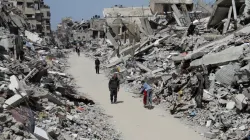Jerusalem: Israel on Friday said it is reopening a key border crossing in northern Gaza as part of steps to increase the flow of humanitarian aid into the beleaguered Palestinian coastal enclave, most of which lies in ruins due to the nearly six-month war. This comes after US President Joe Biden warned Israeli Prime Minister Benjamin Netanyahu that future support for the war depends on Israel taking more action to protect civilians and aid workers.
Israel has approved the reopening of the Erez crossing into northern Gaza and the temporary use of Ashdod port in southern Israel, following the US demands. The growing pressure on Israel came after the killing of seven aid workers in an Israeli strike earlier this week, which triggered global outrage at the continuing crisis over aid deliveries into the besieged enclave.
In addition to reopening the Erez crossing point, which has been closed since it was destroyed during the October 7 attack on Israel, the security cabinet also approved increasing Jordanian aid through the Kerem Shalom crossing point, the statement said. However, the announcement did not include the quantities of humanitarian assistance to be let in through these ports.
After Biden's warning, the White House welcomed moves by Israel to open the Ashdod port and Erez crossing to increase deliveries of humanitarian assistance and to step up deliveries from Jordan directly into Gaza. These steps, said White House spokesperson Adrienne Watson, "must now be fully and rapidly implemented."
Biden's warning to Netanyahu
Biden threatened to place conditions on US support for Israel's offensive in Gaza and called on Netanyahu to take concrete steps to protect aid workers and civilians, seeking for the first time to leverage American aid to influence Israeli military behaviour. The Israeli airstrike in Gaza killed seven aid workers for World Central Kitchen (WCK) founded by celebrity chef Jose Andres, including citizens of the US, Australia, Britain and Poland.
The US president, a lifelong supporter of Israel, has resisted pressure to withhold aid or halt the shipment of weapons to the country. His warning marked the first time he has threatened to potentially condition aid, a development that could change the dynamic of the nearly six-month-old war. Washington is Israel's top weapons supplier and the Biden administration has mostly provided a diplomatic shield for it at the United Nations.
Biden "made clear the need for Israel to announce and implement a series of specific, concrete, and measurable steps to address civilian harm, humanitarian suffering, and the safety of aid workers". By indicating a change in US policy, the 81-year-old President channelled his own frustration along with mounting pressure from his left-leaning political base in the Democratic Party to stop the killings and alleviate hunger among innocent civilians.
Biden also told Netanyahu over a 30-minute phone call that an “immediate cease-fire is essential” and urged Israel to reach such an accord "without delay," according to the White House. The leaders' conversation comes as the World Central Kitchen, founded by restauranteur José Andrés to provide immediate food relief to disaster-stricken areas, called for an independent investigation into the Israeli strikes that killed the group's staff members.
Israel faces growing international isolation
Israel faces growing international isolation after its forces killed seven aid workers helping deliver food in Gaza. After nearly six months of war, the Israeli retaliation for the October 7 attacks, where Hamas-led militants killed 1,200 people and took over 250 hostage in southern Israel, has flattened the coastal enclave of Gaza and killed over 33,000 Palestinians, triggering a humanitarian catastrophe and strengthening calls for an immediate ceasefire.
The United Nations says much of the population in northern Gaza is on the brink of starvation. The top United Nations court has concluded there is a “plausible risk of genocide” in Gaza - a charge Israel strongly denies - and the UN Security Council has issued a legally binding demand for a cease-fire.
Initial expressions of solidarity from Israel's allies have given way to calls for a halt to the fighting. Meanwhile, the UN World Court, looking into genocide allegations against Israel, has ordered Israel to do more to protect Gaza's civilians. Things have only worsened for Israel since then, especially following its killing of seven aid workers in what Netanyahu said was an "unintended" airstrike.
On top of that, weekly protests against the government have grown and attracted thousands. They are rooted in longstanding grievances against Netanyahu — from his political alliances with far-right and ultra-Orthodox parties to his open-ended corruption trial. However, they have drawn new strength from his failure to bring home the hostages.
(with inputs from agencies)
ALSO READ | UAE halts cooperation with Israel on humanitarian aid after killing of aid workers in Gaza
Latest World News
